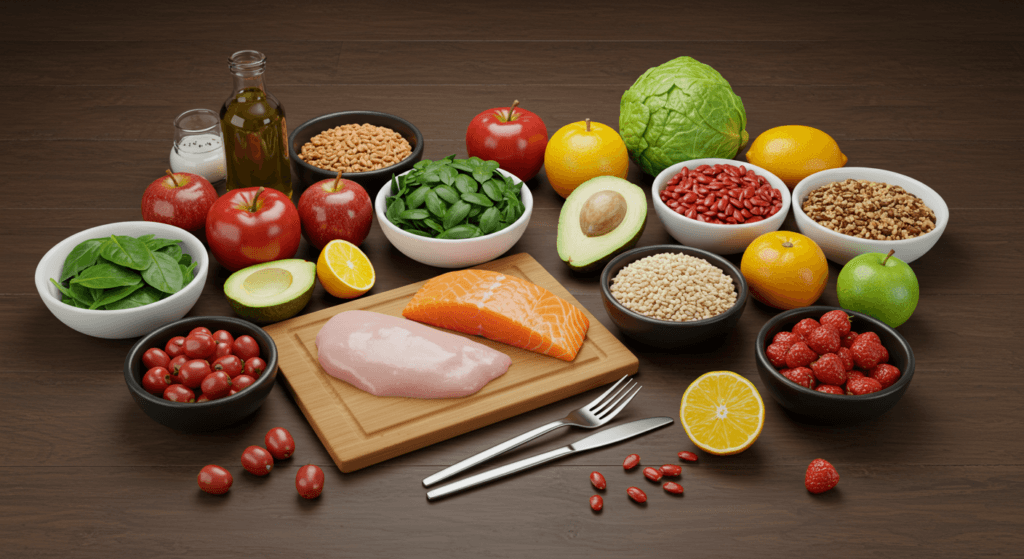
Fats once had a negative reputation, but studies now reveal that healthy fats are vital for overall health. They boost brain function, promote heart health, and aid in weight control. But how do you know which fats are beneficial and which ones to avoid? In this article, we’ll break it all down for you.
What Are Healthy Fats?
Healthy fats are naturally occurring in whole foods and supply essential fatty acids that the body can’t create by itself. These fats include:
- Monounsaturated fats (MUFAs): are present in foods like avocados, olive oil, and nuts.
- Polyunsaturated fats (PUFAs): are found in foods such as fish, walnuts, and flaxseeds.
- Omega-3 fatty acids: are a form of PUFA present in oily fish like salmon.
- Omega-6 fatty acids are: present in seeds and various vegetable oils.
Pro Tip: Healthy fats are necessary for absorbing fat-soluble vitamins (A, D, E, and K), reducing inflammation, and maintaining cell integrity.
Benefits of Healthy Fats
1. Support Heart Health
Research indicates that MUFAs and PUFAs help decrease bad cholesterol (LDL) and boost good cholesterol (HDL), which reduces the risk of heart disease.
| Fat Type | Benefits for Heart Health |
|---|---|
| Monounsaturated | Lowers LDL, raises HDL |
| Polyunsaturated | Reduces inflammation |
| Omega-3 | Improves heart function |
If you’re on a mobile, you might have to swipe left.
2. Improve Brain Function
The brain is nearly 60% fat, and omega-3s are particularly crucial for cognitive function. A study published in Neurology found that higher omega-3 intake is linked to better memory and learning abilities.
3. Aid in Weight Management
Contrary to popular belief, eating healthy fats can help with weight control. Fats are satiating, meaning they keep you full longer, reducing the chances of overeating.
Importance of Fats in Our Body
Fats play a crucial role in hormone production, energy storage, and cell membrane function. They also assist in temperature regulation and provide long-term energy sources.
How Healthy Fats Help Absorb Vitamins
Vitamins A, D, E, and K, which are fat-soluble, need dietary fat to be properly absorbed by the body. Without enough fat, your body struggles to use these essential nutrients effectively.
Support Optimal Cholesterol Levels
Healthy fats help balance cholesterol by increasing HDL (good cholesterol) and reducing LDL (bad cholesterol). This contributes to better heart health and reduced artery blockages.
Lower Cardiovascular Risk Factors
Consuming unsaturated fats has been linked to lower risks of heart disease, stroke, and hypertension. Omega-3 fatty acids are especially effective in lowering triglycerides and reducing blood pressure.
Inflammation and Its Link to Fat
Healthy fats, particularly omega-3s, possess anti-inflammatory effects that help decrease chronic inflammation linked to conditions like arthritis and heart disease.
Hormone Production
Fats are essential for hormone production, including reproductive hormones like estrogen and testosterone. A balanced fat intake supports optimal hormonal health.
Improve Skin Health
Healthy fats contribute to skin elasticity, hydration, and protection against damage. Omega-3s can help reduce acne and eczema symptoms.
Lower Blood Pressure
Omega-3 fatty acids have been shown to improve blood vessel function, leading to lower blood pressure and a reduced risk of heart-related complications.
Benefits of Healthy Fats for Weight Loss
While fats are calorie-dense, they help regulate hunger hormones, keeping you full longer and reducing sugar cravings.
Disadvantages of Unhealthy Fats
While healthy fats are beneficial, trans fats and excessive saturated fats can contribute to obesity, heart disease, and inflammation. It’s best to steer clear of processed and fried foods.
Healthy Fats for Gut Health
Certain fats, like those in olive oil and avocados, support gut bacteria and reduce inflammation in the digestive tract, promoting better gut health.
Pro Tip: Combine healthy fats with fiber-rich foods like veggies or whole grains to improve digestion and keep you full longer!
High-Fat Foods That Are Good for You
- Avocados
- Nuts (almonds, walnuts, cashews)
- Fatty fish (salmon, mackerel, sardines)
- Extra virgin olive oil
- Chia seeds and flaxseeds
- Dark chocolate (85% or higher cocoa)
What Foods Are a Good Source of Unsaturated Fats?
- Olive oil
- Avocados
- Nuts and seeds
- Fatty fish
- Tofu and soy products
Tip: Swap processed snacks for nuts or seeds to boost your intake of healthy fats naturally!
Types of Fat
There are four main types of fat:
- Monounsaturated fats (MUFA): Present in foods like olive oil, avocados, and various nuts.
- Polyunsaturated fats (PUFA): Includes omega-3s and omega-6s found in fish and flaxseeds.
- Saturated fats: Found in dairy and meats, should be consumed in moderation.
- Trans fats: Common in processed foods and best avoided entirely.
Ways to Incorporate Healthy Fats into Your Diet
- Cook with olive oil instead of butter.
- Add avocados to salads and sandwiches.
- Include fatty fish like salmon in your meals twice a week.
- Snack on nuts like almonds and walnuts.
FAQ
Key Takeaways
- Healthy fats are vital for brain function, heart health, and overall well-being.
- They assist in absorbing vitamins A, D, E, and K, ensuring essential nutrient intake.
- Unsaturated fats (found in avocados, olive oil, and fatty fish) promote heart health and reduce inflammation.
- Fats are key for hormone production, enhancing metabolism and body functions.
- Including healthy fats in your diet aids in weight management by increasing satiety.
- Avoid trans fats and limit saturated fats to reduce heart disease risk.
- Balanced fat intake can help lower cholesterol, improve skin health, and support gut health.
Extra Tip: Swap processed snacks for nuts or seeds to boost your intake of healthy fats naturally!
If you found this article useful, share it with a friend and subscribe to our free newsletter at the bottom of the page so I can send you more tips on healthy eating.



